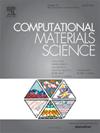Deep learning, deconvolutional neural network inverse design of strut-based lattice metamaterials
IF 3.1
3区 材料科学
Q2 MATERIALS SCIENCE, MULTIDISCIPLINARY
引用次数: 0
Abstract
Machine learning techniques have furnished a new paradigm in the modeling and design of advanced materials, both in the forward prediction of their effective performance and in the inverse identification of designs that meet specific response targets. While numerous architected media with a diverse range of effective mechanical properties have been investigated thus far, the inverse design of beam-based metamaterials with non-uniform inner architectures that emerge as a consequence of evolutionary optimization processes remains a significant challenge. This contribution elaborates a deep learning, deconvolutional neural network based (DCNN) framework which, when combined with a comprehensive parameterization of discrete lattice spaces, enables the inverse engineering of stochastic lattice metamaterials that cover wide mechanical performance spaces. Auxetic, shear soft and stiff, nearly isotropic and highly anisotropic beam-based metamaterial designs are inversely identified, upon a direct request of their desired mechanical performance, without the need of a latent, condensed space representation. The DCNN model is capable of robustly generating beam-based lattice designs with target mechanical attributes that extend beyond those employed in the initial training domain.基于支柱的晶格超材料的深度学习、去卷积神经网络反设计
机器学习技术为先进材料的建模和设计提供了一种新的范式,无论是对材料有效性能的正向预测,还是对满足特定响应目标的设计的反向识别,都是如此。虽然迄今为止已经研究了大量具有各种有效机械性能的结构介质,但如何反向设计基于光束的超材料,以及如何反向设计在进化优化过程中出现的非均匀内部结构,仍然是一个重大挑战。本文阐述了一种基于深度学习、解卷积神经网络(DCNN)的框架,该框架与离散晶格空间的综合参数化相结合,能够对覆盖广泛机械性能空间的随机晶格超材料进行逆工程设计。根据对所需机械性能的直接要求,无需潜在的凝聚空间表示,就能反向确定辅助、剪切软硬、几乎各向同性和高度各向异性的基于梁的超材料设计。DCNN 模型能够稳健地生成基于梁的晶格设计,其目标机械属性超出了初始训练域所采用的属性。
本文章由计算机程序翻译,如有差异,请以英文原文为准。
求助全文
约1分钟内获得全文
求助全文
来源期刊

Computational Materials Science
工程技术-材料科学:综合
CiteScore
6.50
自引率
6.10%
发文量
665
审稿时长
26 days
期刊介绍:
The goal of Computational Materials Science is to report on results that provide new or unique insights into, or significantly expand our understanding of, the properties of materials or phenomena associated with their design, synthesis, processing, characterization, and utilization. To be relevant to the journal, the results should be applied or applicable to specific material systems that are discussed within the submission.
文献相关原料
| 公司名称 | 产品信息 | 采购帮参考价格 |
|---|
 求助内容:
求助内容: 应助结果提醒方式:
应助结果提醒方式:


